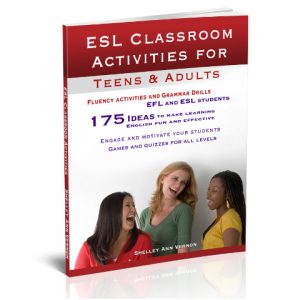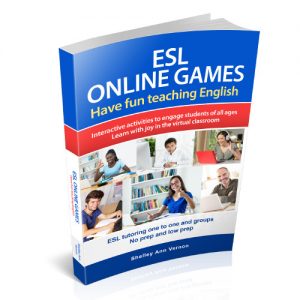Hello ESL teachers, welcome to this lesson plan with fun vocabulary games for adults and teens. Make your lessons fun and motivate your students!
Lesson plan for preferences
The target words for this lesson are:
- keen on
- interested in
- bored with
- good at, and,
- brilliant at.
However, all the vocabulary games for adults in this lesson plan may be adapted to any themes.
Presentation
To start, compare the two phrases keen on and interested in. For example, keen on is one step up than interested in. Next, explain the other expressions of preference and, finally, check comprehension. To verify that students understand the various nuances of preference, say, ‘Pete is interested in video games. Phil is keen on video games. Who prefers video games?’
Appeal to your kinaesthetic learners and make meaning tangible
First, put students into groups of 3 or 4 to silently prepare each of these three concepts using mime. Allow 1 minute for each phrase.
Next, bring three groups to the front and label them A, B and C. Discreetly tell each group what to act. For example, group A will mime ‘keen on,’ B, ‘interested in,’ and C, ‘bored with.’ All groups perform simultaneously, and when you say FREEZE, everyone freezes in position. The rest of the class study the frozen people-pictures and vote as to which is which. Voting could be done as a class. However, it would be helpful to put students into groups to discuss their answers and then vote as a team. That speaking activity would have them practising the new vocabulary naturally since it will be hard to talk about their choices without using the target language!
Please be bold and try the above idea! Here’s feedback from Noreen Lobo, who uses lots of my vocabulary games for adults. Noreen used the above activity for the present continuous, and it was a blast! She says:
I love all your ideas and use so many. For example, last week I used the game for “cleaning windows” and “making a snowman” and then said FREEZE. Students were frozen in hilarious positions, and the other team loved guessing what they were doing and then having their turn. You are right up my street; I constantly pick up your book and have another look for a new idea. I really like this one for “interested in,” etc. Thanks again!
Appeal to auditory learners
Change activity and have the class interview each other to find someone interested in, for example, politics and someone keen on video games. Let students pick their own topics. Students circulate in class, asking each other, and taking notes.
Next, students may share their results while the class listen and memorize as much as possible. For example, Sarah is interested in classical music, but she is keen on hip-hop. A student writes this sentence on the board. Continue until there are six sentences on the board. These sentences are ready for the next game.
Appeal to visual learners and challenge students’ memory
Now play ‘Fill in drill‘ using the sentences you have written on the board:
Game Tips
I recommend rubbing out the key terms interested in, keen on, and bored with rather than the names of the people, since that will force students to concentrate on those terms and memorize them.
Since this is a drill game, be draconian with accuracy. You don’t want students to drill the wrong thing, such as ‘interested at and keen in’, or they may make mistakes for life.
Good at and brilliant at
Next, introduce and compare ‘good at’ and ‘brilliant at.’ Check comprehension. Jeff is good at golf. Sarah is brilliant at golf. Who is better?
Learn something new
Play a memory game where each class member says, “I’m good at…” or I’m brilliant at…” All students note these down. Put the class in teams. First, give students a minute to memorize what they can before turning their papers face down. Then, do a quiz. For round one, work with class members. For one point, who is brilliant at maths? Award points and keep score.
For round two of the quiz, give students two minutes to write some general knowledge questions of their own. For example :
- Who is brilliant at maths? Answer: Albert Einstein.
- Who is brilliant at tennis? Answer: Roger Federer.
- Who was brilliant at impressionist painting? Answer: Van Gogh
- Who is brilliant at playing the guitar? Answer: Dave Grohl (or whoever students know)
Students ask their questions to the opposite team and keep score. If your students are numerous, divide them into several teams that play simultaneously.
These vocabulary games for adults are in my fun book of ESL / EFL activities for teens and adults. Get them here in download or paperback. For online teachers, the ESL Online Games are what you need.
-
Sale Product on sale
 Games and Activities for Teens and Adults
Games and Activities for Teens and Adults$23.96Original price was: $23.96.$18.40Current price is: $18.40.Rated 5.00 out of 5 based on 12 customer ratings -
 ESL Online Games$23.96Rated 5.00 out of 5 based on 4 customer ratings
ESL Online Games$23.96Rated 5.00 out of 5 based on 4 customer ratings



6 thoughts on “Vocabulary games for adults”
I think it’s also a great idea to work with student’s own reality, I mean, as a good teacher observer I would previously check sort of things my students are good at, brilliant at, keen on and things they get bored with – that could be used as an alternative to teach those vocabulary.
Hello Luciano, thanks for your point, yes, excellent point. I have students interview each other to find out what their interests are. and play a memory game using the data.
All the best
Shelley
Hi Shelley I work one on one with a refugee woman who is a complete beginner and not literate in her own language. Any good resources u are aware of? Thanks!
Hello there Sherry, have you got my teen/adult games book? There are language drills in there for complete beginners. Also there are games for understanding and speaking as well as reading and writing. If you have the book, use the step one and step two games first, to teach vocabulary and basic grammar. You can teach the alphabet and phonemes using those games too.
You might want to get a textbook, like Headway, as well, but before that, I’d use my drill games to get some basics down, and the alphabet – since a textbook will be no good for someone who can’t read.
Find out what this lady’s priorities are. Does she need to be able to communicate urgently – if so, concentrate on speaking to start out with, and perhaps teach one or two phonemes per lesson as well as vocabulary and useful phrases.
This blog might help:
https://www.teachingenglishgames.com/teaching-english-to-refugees